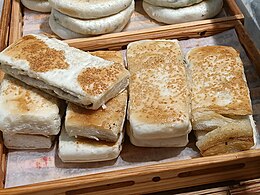Jiucai hezi
 Pan-fried jiucai hezi at a restaurant in Chongwenmen | |
| Place of origin | China |
|---|---|
| Region or state | Shandong |
| Main ingredients | Garlic chives, egg, cellophane noodles, wheat flour |
| Jiucai hezi | |||||||
|---|---|---|---|---|---|---|---|
| Traditional Chinese | 韭菜盒子 | ||||||
| Simplified Chinese | 韭菜合子 | ||||||
| Literal meaning | chive box | ||||||
| |||||||
Jiucai hezi (Chinese: 韭菜盒子 "chive box"), also called chive pockets, are a type of savory pie originating from Shandong, China. They are made of Chinese chives and eggs in a flour wrapper, then pan fried or baked. Jiucai hezi are traditionally eaten to celebrate the Chinese New Year.
Description
[edit]The dough is made from flour and water, with leavened and unleavened varieties. The stuffing typically includes chopped garlic chives, scrambled eggs,[1] sauteed mini-shrimp and cellophane noodles. Mushrooms and wood ear fungus are sometimes included. There is also a variety with minced meat as stuffing.[2] The stuffing will be put in the middle of a flat dough, and then folded into half-moon shape. The finished turnover is usually pan-fried instead of baked in the oven like a turnover, and is served with black rice vinegar and sesame oil mixture as dip.
Gallery
[edit]-
With sesame
-
Stuffing inside
See also
[edit]References
[edit]- ^ Chinese chive pockets (韭菜盒子) – Red House Spice July 10, 2017, Retrieved on September 16, 2017
- ^ Chinese Chive Pie (Leek Pie, Garlic Chive Pie, Chinese Chive Box, 韭菜盒子) - Tiny Urban Kitchen February 6, 2014, Retrieved on September 16, 2017



